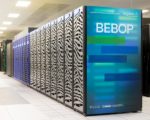NVIDIA and Argonne National Laboratory this morning announced Polaris, a GPU-based supercomputer, with 2,2240 NVIDIA A100 Tensor Core GPUs delivering 1.4 exaflops of theoretical AI performance and about 44 petaflops of peak double-precision performance, up to 4X faster performance than Argonne’s current supercomputers. Argonne is calling the new system, called “Polaris,” a “testbed” supercomputer to […]
Porting a Particle-in-Cell Code to Exascale Architectures
By Nils Heinonen on behalf of the Argonne Leadership Computing Facility As part of a series aimed at sharing best practices in preparing applications for Aurora, we highlight researchers’ efforts to optimize codes to run efficiently on graphics processing units. Take advantage of upgrades being made to high-level, non-machine-specific libraries and programming models Developed in […]
Argonne’s Rick Stevens named ACM Fellow
Rick Stevens has been named a Fellow of the Association of Computer Machinery (ACM). Stevens is associate laboratory director of the Computing, Environment and Life Sciences directorate at the U.S. Department of Energy’s (DOE) Argonne National Laboratory and a professor of computer science at the University of Chicago. Stevens was honored “for outstanding contributions in […]
Quantum: UChicago Researchers Show Qubits Retaining Information for Hours or Longer — ‘An Eternity’
Touting major potential implications for quantum computing, researchers at the University of Chicago have released a study in which they demonstrated control of “quantum memories of silicon carbide,” the ability to control individual quantum bits — qubits — that retain information for hours or possibly days, instead of fractions of a second. In a paper […]
Veteran Argonne System Helps Find Method to Convert CO2 into Ethanol
By supercomputing standards, Argonne National Lab’s Bebop (stood up in 2017, 1.75 teraflops, bumped off the Top500 list after the June 2019 ranking) seems something of a second-tier player. But veteran, formerly non-Top500 systems like Bebop can still take a star turn, as shown by the results of a research team from Northern Illinois University […]
Exascale Exasperation: Why DOE Gave Intel a 2nd Chance; Can Nvidia GPUs Ride to Aurora’s Rescue?
The most talked-about topic in HPC these days – i.e., another Intel chip delay and therefore delay of the U.S.’s flagship Aurora exascale supercomputer – is something no one directly involved wants to talk about. Not Argonne National Laboratory, where Intel was to install Aurora in 2021; not the Department of Energy’s Exascale Computing Project, […]
DOE Unveils Blueprint for ‘Unhackable’ Quantum Internet: Central Roles for Argonne, Univ. of Chicago, Fermilab
At a press conference held today at the University of Chicago, the U.S. Department of Energy (DOE) unveiled a strategy for the development of a national quantum internet intended to bring “the United States to the forefront of the global quantum race and usher in a new era of communications.” An outgrowth of the National Quantum […]
Argonne Claims Largest Engine Flow Simulation Using Theta Supercomputer
Scientists at the U.S. Department of Energy’s (DOE) Argonne National Laboratory have conducted what they claim is the largest simulation of flow inside an internal combustion engine. Insights gained from the simulation – run on 51,328 cores of Argonne’s Theta supercomputer – could help auto manufacturers to design greener engines. A blog post on the […]
Agenda Posted for OpenFabrics Virtual Workshop
The OpenFabrics Alliance (OFA) has opened registration for its OFA Virtual Workshop, taking place June 8-12, 2020. This virtual event will provide fabric developers and users an opportunity to discuss emerging fabric technologies, collaborate on future industry requirements, and address today’s challenges. “The OpenFabrics Alliance is committed to accelerating the development of high performance fabrics. This virtual event will provide fabric developers and users an opportunity to discuss emerging fabric technologies, collaborate on future industry requirements, and address challenges.”











